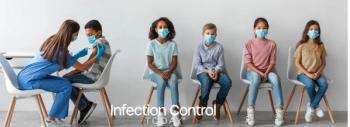
On the Frontlines With Kalia Murray, EMT in Brooklyn
Kalia Murray, EMT: "We are the first ones to arrive on a scene, often having no idea what we're walking into."
Kalia Murray, an emergency medical technician with the Richmond County Ambulance based in Brooklyn, New York. Can you start off and share with us what it has been like working as an EMT on the frontlines during a global pandemic?
Infection Control Today®: Can you share with us what it has been like working as an EMT on the frontlines during a global pandemic?
Kalia Murray: One thing I think that’s a little bit different from maybe other people you’re speaking with, like doctors and nurses who are with these patients for longer periods of time, we are the first ones to arrive on a scene, often having no idea what we're walking into. It’s hard to say sometimes, if it’s necessarily a COVID-related incident. It could be a call for somebody who fell and broke their ankle. And while you’re on the scene, you realize there’s more going on than just their injury. And sometimes you go, and you think it’s going to be a COVID-related call and it turns out not to be. It’s sort of an interesting situation being the first one there. You never have the full story. And unfortunately, I don’t get to follow up often and get the rest of the story.
ICT®: But you still have to be prepared and probably treat every case as though it’s a COVID case, in terms of your personal protective equipment and that sort of thing, right?
Murray: Yes, we treat every call as if it’s a COVID-19 call. We have to gear up the best that we can and try to protect ourselves regardless of what the call is.
ICT®: Has there been any discernible change in the volume of non-COVID calls?
Murray: Oh, for sure. All calls are up. I’m on emergency calls, and I have dispatch asking me how soon I can be finished because they have another one waiting for me. It’s not uncommon that people are home by themselves watching the news, and they get scared. And they think that they’re sick and they’re calling for help. And oftentimes, they’re not showing any signs or symptoms and they’re totally seemingly healthy. And also people are home by themselves; people are finding themselves in trouble a little bit more. They’re drinking more than they should be and falling. Cooking related accidents: They’re burning their hand on the stove and things like that. So, all around, the calls are definitely up.
ICT®: What infection prevention measures and precautions does your team take while working in the field that’s maybe different from prior to the COVID pandemic?
Murray: We have N95 masks that we use. Unfortunately, we use them for at least a week at a time. We’re very low on them so they try to stretch it out as long as possible. We’re known to stapled them back together when they break. Yeah, it’s crazy. But we layer it then with the surgical mask if we can find one. We have goggles that we wear. And recently we’ve been given shields that we can use to cover our entire faces. We have gloves always. That was something that we did prior to this situation. So that’s no change. Gowns are the one thing that we don’t really have on stock on our ambulance. We have just a couple. We sort of rely on hospitals and nursing homes to help provide that if they can when we’re there.
ICT®: We hear a lot about the toll that this is taking emotionally on healthcare workers. Can you speak to that at all?
Murray: Yeah, of course. It’s exhausting. It’s mentally and physically exhausting. A lot of our first responders got sick early on, and they’re home recovering. There are fewer people on the road. I mean, more calls for the people that are on the road. Overtime is not even an option anymore. It’s a definite. Some people do two or three shifts in a row. And I know the nurses and doctors are doing the same thing just around the clock working. Everyone is all-hands-on-deck.
ICT®: What do you want your colleagues to know about what’s going on on the frontlines? If you could share one piece of advice right now what would that be?
Murray: I appreciate them so much. We are definitely working as a team. More than ever, we always have known that we need to work as a team. But I definitely see a stronger united front from everybody. We’re all in this together. We’re scared too. We have families that we have to come home to every day that are terrified that we’re going to bring something home with us and make them sick too. We are physically and mentally drained. It’s not uncommon to have a devastating call, knowing that your patient isn’t going to make it through the rest of the day. And to hide in the corner of the ambulance for a few seconds and just cry it out because we’re tired and it’s very, very depressing.
ICT®: What sort of precautions are you personally taking when you get off a shift and you come home?
Murray: If I can, I try to wash my uniform as soon as I can. When I get to my apartment, I take off all my clothes and it’s either in a garbage bag or I just leave it on the floor outside and go immediately into the shower and wash.
ICT®: Is there anything else that you would like to add?
Murray: I really appreciate how supportive the New York community has been. A lot of people have been coming forward and just stopping us on the street to thank us for being there and for doing our part. But it’s my job. I’m happy to be doing it. I really appreciate that people have been really supportive. It’s very touching. And I hope that that continues because it’s scary times. And it’s hard to come home after a 12- or 15-hour day, and you don’t have time to take a break. There’s no time for food. There’s no time for water. We’re just running around trying to take care of everybody else. I hope that that appreciation continues and that people will stay home and continue to social distance because I know it’s getting warmer outside and people don’t necessarily want to do that at this time.
Newsletter
Stay prepared and protected with Infection Control Today's newsletter, delivering essential updates, best practices, and expert insights for infection preventionists.




